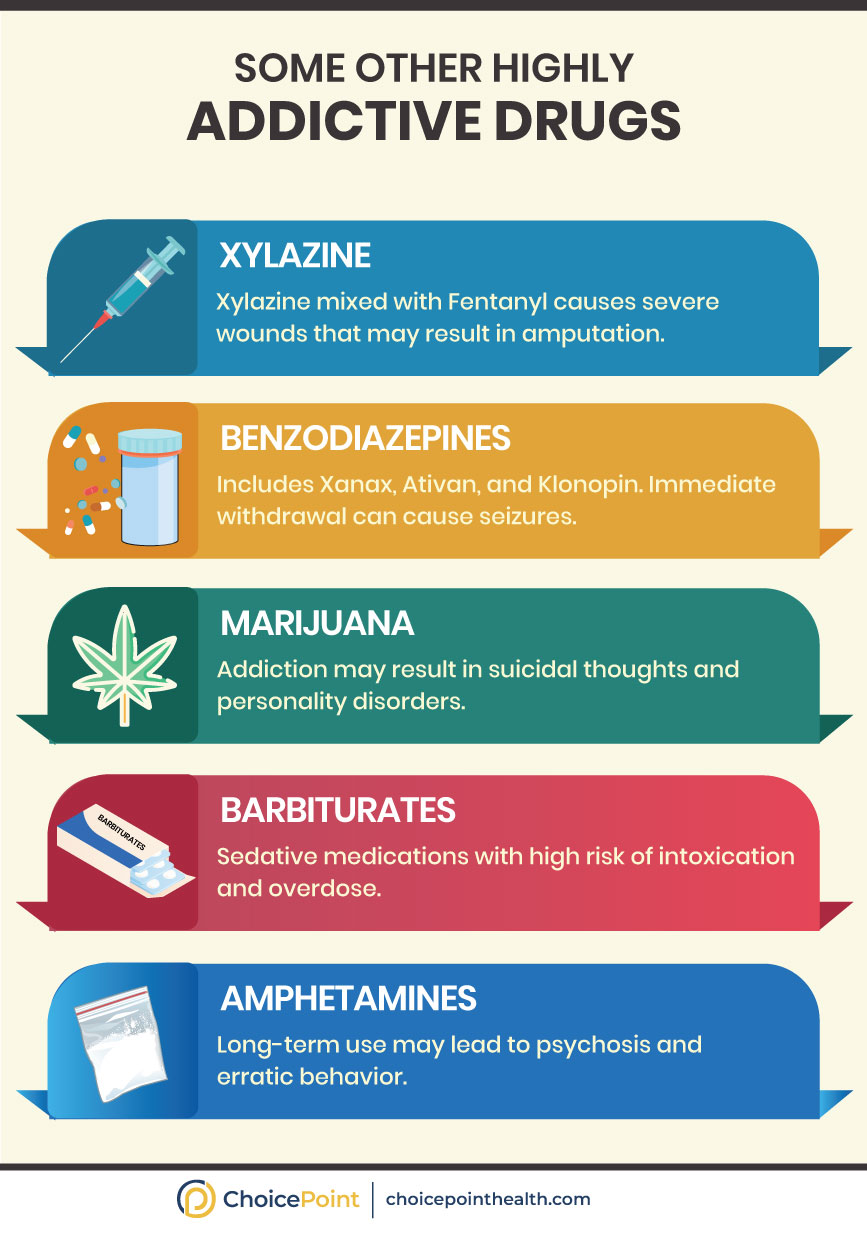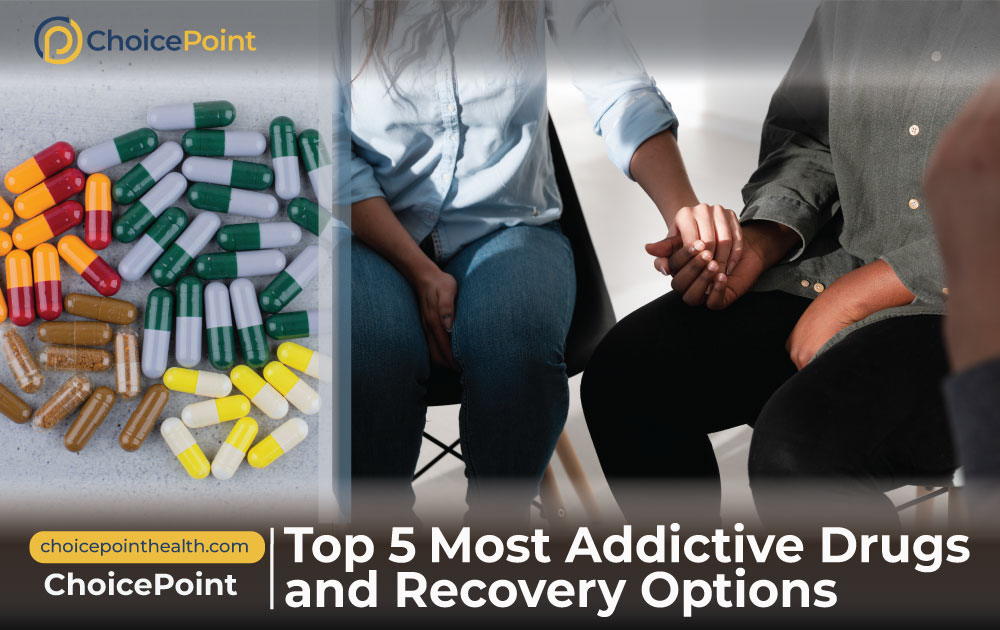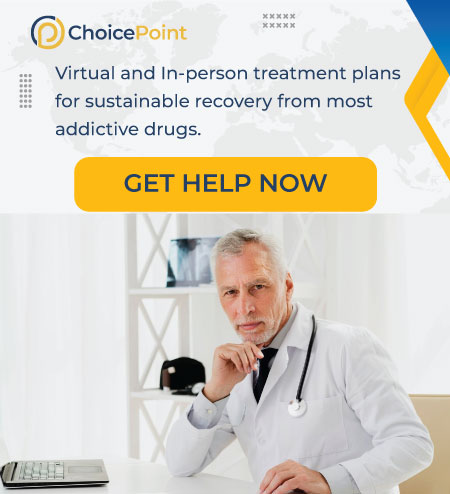Almost 38 million Americans abused illegal drugs in 2020. Among the illegal drug users, 25% had a drug disorder. While the stats for the most addictive drugs are alarming, it is important to understand that addiction can happen to anyone. Drugs have built-in addictive active ingredients in them that affect the working of the brain and the body, hence leading to substance dependence and, ultimately, addiction.
In this medically-reviewed blog, we cover:
- List of most addictive drugs
- Treatment options to recover from drug abuse
Table of Contents
Top 5 Most Addictive Drugs Of All Times
Drug addiction is a disease classified by the inability to quit drug use despite the harmful consequences. We have compiled a list of the most addictive drugs to help you stay clear. These drugs are extremely addictive even if used in minute quantities.
Number 1# Heroin
It has been reported that nearly 1 million people in the U.S. abuse heroin annually. Heroin is a very addictive opioid made from morphine. People snort, inject, or smoke it. Heroin is a fast-acting drug and is classified as a depressant.
Heroin acts on the central nervous system and produces a series of reactions resulting in:
- Release of dopamine that produces false euphoria
- Muscle relaxation
- Slowed heart rate
- Out of the body feeling, users feel like the world has slowed down
- Block pain receptors offering temporary pain relief
There has been a sharp increase in heroin use because of growing prescription opioid abuse such as Fentanyl and Oxycodone. People addicted to these opioids look for cheaper and stronger alternatives. Heroin is cheaper than prescription opioids but more dangerous. As you do not know the concentration of the drug you are taking, you might take more than intended, resulting in an overdose. Heroin overdose can lead to coma or even death.
Devastating Consequences Of Heroin Addiction
Injecting heroin increases the risk of AIDS and hepatitis. Negative side effects of this drug also include:
- A drop in body temperature
- Slowed breathing, which may lead to respiratory depression
- Risk of overdose, which may lead to convulsions (involuntary contraction of muscles), coma or even death
- Changes in the physiology of the brain
- Mental disorders
- Fertility problems and miscarriage
- Increased chances of lung diseases such as tuberculosis and pneumonia
How To Recover From Heroin Addiction?
Leaving Heroin cold turkey increases the chances of a relapse, risk of overdose, and uncomfortable withdrawal symptoms. It is best to recover under the supervision of a trained, experienced, and certified medical staff who can handle the risks associated with the withdrawal.
For recovery, experts regard a combination of medication-assisted treatment with behavioral therapy as a gold standard. Some FDA-approved medications for heroin addiction treatment include:
- Lofexidine
- Subutex
- Naltrexone
- Suboxone
Do not let drug addiction consume you! Begin your healing journey today by calling us at 844.445.2563.
Number 2# Nicotine
Nicotine is the main ingredient in tobacco products. It is one of the most addictive drugs and is classified as a stimulant drug. It temporarily makes a person feel more alert and energized. However, the effects are short-lived. Nicotine has a very short half-life of 2 hours. This short half means that the effects of nicotine go away immediately, so people feel the urge to smoke again.

Did you know? Smoking claims nearly half a million Americans’ lives each year. And over 16 million live with a serious illness caused by smoking.

Did you know? Smoking claims nearly half a million Americans’ lives each year. And over 16 million live with a serious illness caused by smoking.
Dangers of Smoking Nicotine
Tobacco use and smoking is linked with serious health conditions such as:
- Dizziness and lightheadedness
- Shortness of breath
- Digestive problems such as heartburn
- Lung cancer
- Increased risk of heart disease and stroke
- Increased risk of preterm delivery and miscarriage
Furthermore, smoking has been linked to different types of cancer, including lung cancer, pancreatic cancer, and breast cancer.
How To Quit Smoking?
There are a lot of ways to quit smoking, and self-determination tops them all. When you quit smoking, you may experience intense withdrawal symptoms and strong urges to start smoking again. However, you can overcome them through:
- Medical counseling: Counselors will make an individualized plan for you on how to quit smoking
- Nicotine replacement therapy: Your health care provider may recommend nicotine spray, patches, or gum to help you give up cigarettes
- Medication-Assisted Treatment: The MAT program can help you with intense withdrawal symptoms. Varenicline and Bupropion may be prescribed.
- Motivational group therapy: Group therapy is a great way to recover with people sharing your struggles.
Virtual medical counseling is a great way to begin your healing journey. Call now at 844.445.2563.

The Different Types of Addictive Drugs
Number 3# Cocaine
Cocaine is a powerful stimulant drug. In the early years, cocaine was used as a local anesthetic for surgeries. However, research has shown that cocaine is one of the most addictive drugs. It can alter the brain structure and normal function with frequent use.
Cocaine can be snorted, injected, or rubbed. It produces a
- False euphoria,
- Alertness
- Excitability
- Enhances risk-taking ability
The effects of cocaine are very short-lived. The ‘high’ associated with crack or cocaine use lasts only for less than two hours, making a person use it repeatedly.
Exploring The Dark Side Effects of Cocaine Addiction
There are no safe levels of cocaine consumption. Even small amounts can harm you. Side effects associated with cocaine use include:
- Extreme anxiety
- Affects the ability to think straight
- Hallucinations
- Risk of stroke
- Injecting cocaine increases the risk of hepatitis B, hepatitis C, and AIDS.
Cocaine overdose can lead to heart attack, seizures, stroke, and a possibility of death. It is essential to recognize early signs of drug overdose to minimize the associated risks.
How To Quit Cocaine?
It is recommended that you seek medical help for cocaine addiction. Leaving this drug on your own can lead to a relapse because of intense withdrawal symptoms such as:
- Fatigue
- Depression
- Restlessness
- Anxiety
- Suicidal thoughts
Usually, inpatient medical treatment is recommended for recovery. After stabilizing your condition, you may be recommended for partial care or an outpatient program. Some treatments you can expect are:
A. Medication-assisted Treatment
Currently, there are no FDA-approved medications specifically for cocaine addiction, but antidepressants can be prescribed to improve mental health-associated withdrawal symptoms.
B. Dual-diagnosisTreatment
As discussed earlier, cocaine addiction has several mental health implications. A dual-diagnosis treatment treats both mental health and addiction simultaneously for wholesome recovery.
C. Behavioral Therapy
Behavioral therapy has shown success in substance abuse treatment. It teaches essential coping mechanisms and emotional regulation to help you abstain from drugs.
Number 4# Alcohol
There is no surprise that alcohol is on the list of the top most addictive drugs. It has been reported by NIAAA (National Institute of Alcohol Abuse and Alcoholism) that in 2022, 29.5 million Americans over the age of 12 suffered from alcohol use disorder.
Alcohol is a depressant. It slows the central nervous system. Alcohol use has been linked with serious mental health and physical health conditions. While alcohol addiction on its own can be fatal, combining it with other drugs such as tramadol, Suboxone, and Xanax can lead to respiratory depression, resulting in a coma.
What Could Go Wrong With Alcohol Addiction?
As alcohol is metabolized in the liver, it directly affects the liver’s health. Alcohol addiction can lead to liver cirrhosis. It has been reported that 50% of liver chorisis-related deaths involve the use of alcohol.
NIAAA further lists these side effects of alcohol addiction:
- Increased risk of heart diseases
- Depression
- Chances of stroke
- Increased risk of oral, liver, and esophagus cancer
- Increased risk of accidental deaths like driving accidents

Did you know? Among 100,530 liver disease deaths, 47.4% involved alcohol.

Did you know? Among 100,530 liver disease deaths, 47.4% involved alcohol.
Thinking About Quitting Alcohol Addiction?
Quitting alcohol on your own can be risky and difficult. A safe option is to seek medical help. There is a lot of research done on alcohol addiction treatment. Healthcare experts are equipped with the latest knowledge to help you safely abstain from alcohol.
Some medications beneficial for alcohol use disorder include:
- Naltrexone
- Acamprosate
- Disulfiram
While medications can reduce the chances of relapse and curb cravings, a holistic treatment approach, including therapy and counseling, is the best choice for the wholesome recovery of the body, soul, and mind.
Denying yourself the treatment you deserve can be catastrophic for you! Start recovering today by calling us at 844.445.2563.
Number 5# Opioids
The United States, even the whole world, has been suffering from an unending opioid addiction crisis. Opioids, derived from opium plants, are used in pain management. There are two classes of opioids: illegal and prescription-based opioids.
I. Illegal Opioids
Illegal opioids are derived in a laboratory. These are used for recreational purposes. These drugs are extremely dangerous because active compounds are not regulated. Users do not know how much addictive active compound they are consuming, which increases the chances of an overdose.
Examples include:
- Heroin
- Synthetic fentanyl
- Xylazine
II. Prescription-based Opioids
Prescription-based opioids are used in pain management and as an analgesic during surgeries. People often misuse these because of the pain relief and euphoria associated with the use.
Examples of prescription opioids include:

Did you know? Opioids account for 7 out of 10 drug overdose deaths.

Did you know? Opioids account for 7 out of 10 drug overdose deaths.
Side Effects Of Opioid Abuse
Opioid abuse may lead to addiction and overdose, which may result in:
- Breathing problems
- Unconsciousness
- Respiratory depression
- Death
If you suspect a person is suffering from opioid overdose, please do not hesitate to administer naloxone and call emergency services. Naloxone is a life-saving antidote that reverses the effects of an opioid overdose.
How To Prevent and Treat Opioid Addiction?
Opioid addiction can be prevented if you use the medicines exactly as prescribed by the doctor. Furthermore, please do not share your prescription with anyone else. The good news about opioid addiction is that it is treatable. Licensed addiction specialists in a treatment center can help you withdraw from opioids. If your addiction levels are moderate, you may be put on a tapering-off plan where the dose of opioids is gradually reduced to prevent opioid withdrawal symptoms.
Alternatively, you may be prescribed medications to treat addiction. These medications include:
- Suboxone
- Subutex
- Naltrexone
- Antidepressants
Recover From Addictive Drug Abuse With ChoicePoint
Now that you know about the dangers and side effects associated with the most addictive drugs, it is time to reflect if you are abusing any of these drugs. ChoicePoint is a leading addiction treatment and mental health improvement center. Our solution-focused and highly personalized treatment plans have helped several clients lead a happy and sober lifestyle.
Some features of our treatment plans include:
- Providing all ASAM levels of care, including inpatient, outpatient, and telehealth services.
- Compliance with all ethical and professional guidelines
- 24/7 virtual support
- DEA-certified and compassionate clinical staff
Take a look at what our patient has to say:
I don’t know where to begin. I have been with Choicepoint for about 2 years. Ever since joining, I feel my life has turned around. I would not be where I am today if it wasn’t for Samantha. She has been my counselor ever since joining. Samantha helped me through this journey since day one. I can not thank her enough. She has always been there for me through the good times and bad. I look forward every month to my meetings with her because she knows how to help me through all the bad times I’ve had. My relationship with my wife and kids would not be the way it is if it wasn’t for Sam helping me get through this. She has even helped me overcome the tension with my inlaws. Again Samantha thank you so much for putting me back into this position I am now; my life has not been this good and successful as I can remember. You are the best counselor anyone can ask for!
I don’t know where to begin. I have been with Choicepoint for about 2 years. Ever since joining, I feel my life has turned around. I would not be where I am today if it wasn’t for Samantha. She has been my counselor ever since joining. Samantha helped me through this journey since day one. I can not thank her enough. She has always been there for me through the good times and bad. I look forward every month to my meetings with her because she knows how to help me through all the bad times I’ve had. My relationship with my wife and kids would not be the way it is if it wasn’t for Sam helping me get through this. She has even helped me overcome the tension with my inlaws. Again Samantha thank you so much for putting me back into this position I am now; my life has not been this good and successful as I can remember. You are the best counselor anyone can ask for!
Frequently Asked Questions About Top 5 Most Addictive Drugs
People often ask us these questions about most addictive drugs
What is Drug Addiction?
Drug addiction is a chronic disease classified by compulsive drug-seeking behavior despite being aware of the adverse consequences.
What Are Barbiturates?
Barbiturates are sedative medications. These are prescribed to treat headaches, insomnia, and seizures. They usually cause a person to feel relaxed and sleepy.
What Are the Reasons for Drug Addiction?
The causes of drug addiction include:
- Peer pressure
- Trauma or stress experienced
- Early exposure to drugs
- Any event related to physical and sexual
- Family history of abuse
- Genetic predisposition to drug abuse
Does Insurance Cover Drug Addiction Treatment?
Yes, most addiction treatment plans are covered by insurance. The extent of coverage differs from one company to another. You can verify your insurance plan online if you need clarification.
Medical Disclaimer:
ChoicePoint aims to improve the quality of life for people struggling with substance use disorder and mental health issues. Our team of licensed medical professionals research, edit and review the content before publishing. However, this information is not intended to be a substitute for professional medical advice, diagnosis, or treatment. For medical advice please consult your physicians or ChoicePoint's qualified staff.











Review Top 5 Most Addictive Drugs and Recovery Options.